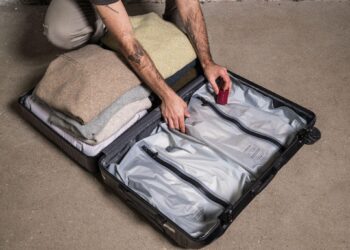Many of us dream of a European vacation, with its history, landscapes and culture. But nothing can kill your experience faster than health issues.
From minor illnesses to serious medical problems, unexpected health problems can ruin your trip. With some planning you can avoid many of these and have a trouble free European adventure.
In this post we will cover the top tips to stay healthy, and why travel insurance is important.
Before You Go
Before you start your European adventure, plan your health as much as you plan your itinerary.
Research Health Requirements
Research the health requirements of European countries. Some countries may require specific vaccinations or preventive measures for travelers. For example some regions in Europe may recommend vaccines for hepatitis or rabies depending on your activities and destination. Check current travel health risks with the European Centre for Disease Prevention and Control.
Pack a Health Kit
When traveling it’s important to have access to your medications and first aid supplies. Pack a small kit with over-the-counter painkillers, antidiarrheals, antihistamines, antiseptic cream, bandages and any prescribed medications you take regularly. To avoid problems at customs make sure your prescriptions are with you and your drugs are in their original packaging.
Get a Health Check-Up
It’s a good idea to schedule a check-up with your doctor before you go. Discuss any health concerns and if you have pre-existing conditions ask for advice on how to manage your health abroad. If needed get any booster shots or vaccines well before your trip so they have time to take effect.
Stay Hydrated and Eat Well
Eating the right foods and drinking plenty of water is key to staying healthy on your trip.
Drink Water Regularly
Dehydration is a common problem for travelers especially when exploring under the sun or walking around tourist sites for hours. Carry a refillable water bottle with you and fill it up often. Some European countries like Switzerland and Iceland have clean tap water, while in others it’s better to stick to bottled water.
Avoid Street Food in Certain Areas
While Europe has great street food markets, be cautious in certain areas. In high tourist areas hygiene standards can vary and eating undercooked or contaminated food can cause food poisoning. Stick to cooked food and avoid raw food if you’re not sure of its freshness.
Eat Local Food Safely
Trying new food is part of the fun of traveling but sudden changes in your diet can sometimes cause stomach issues. Introduce local food gradually and give your digestive system time to adjust. Eat smaller portions of new food and avoid food you’re allergic to or sensitive to.
Be Prepared for the Season
Europe’s weather can change dramatically by season and region so protect yourself from the elements.
Dress for the Climate
Make sure you dress according to the weather of your destination to stay cool and prevent hypothermia or heatstroke. Wear a hat, sunglasses and light, breathable clothing in summer to protect your skin from the sun. In winter layer up with thermal wear, a coat and waterproof shoes to stay warm and dry.
Wear Sunscreen
The European sun can be strong especially in southern regions like Spain, Italy and Greece. Sunscreen is a must even on cloudy days to prevent sunburn. Apply SPF 30 or higher every two hours if you’re outside and don’t forget to protect your face, neck and hands.
Rest Up
It’s easy to get caught up in the fun of a new place but if you don’t rest you’ll be run down and that can compromise your immune system and make you sick.
Sleep First
Jet lag can be bad for your health especially if you’re crossing time zones. Make sure you adjust your sleep schedule before you leave and once in Europe try to get on local time as soon as possible. Don’t overdo it in the first few days – let your body adjust to the new environment.
Schedule Downtime
Your itinerary may be packed but you need to schedule breaks. Plan for downtime whether it’s a slow afternoon at a café or a day at the beach. This will not only help you recharge but also reduce stress which can cause health problems while traveling.
Avoid Common Travel Illnesses
Traveler’s diarrhea, respiratory infections and other common travel related illnesses can ruin a trip in no time.
- Practice Good Hygiene: Always wash your hands with soap and water especially after using the public restroom or before eating. Carry hand sanitizer for situations where soap isn’t available. Also avoid touching your face as germs can enter the body through your mouth, nose and eyes.
- Stay Active and Stretch: Long flights or train journeys can cause deep vein thrombosis (DVT) a potentially deadly illness where blood clots develop in the legs. To prevent DVT move around every hour during long journeys, stretch your legs and consider wearing compression socks to promote blood circulation.
Know Your Contacts
No one plans to get sick or injured on vacation but being prepared can make a big difference in how you handle emergencies.
Know the Local Emergency Numbers
Before you leave, research the emergency contact numbers for medical assistance in each country you’re visiting. In most European countries 112 will get you to emergency services.
Find Hospitals and Pharmacies
Get to know the nearest hospitals or medical centers especially if you have a pre-existing condition that may need attention. Also get to know the local pharmacies – many European pharmacies have over the counter meds for colds and allergies.
Don’t Forget Travel Insurance
One of the most important steps in avoiding health related setbacks on your European vacation is to get comprehensive travel insurance.
Why Travel Insurance Matters
Even if you’re healthy, accidents and unexpected illnesses can happen anytime. Medical care in Europe can be expensive especially for non-residents. Without proper travel insurance you may end up paying out of pocket for medical treatment which can cost thousands of euros. Travel insurance not only covers medical emergencies but also other unexpected events like trip cancellations, delays or lost luggage.
Also some Schengen countries require travel insurance as part of the visa application process. Even if it’s not required for your trip, having insurance will give you peace of mind knowing you’re covered for various health related incidents.
Conclusion
A European vacation is an adventure to explore new cultures and create lifetime memories. But unexpected health issues can ruin even the best planned trips. By preparing ahead of time, taking care of your health while traveling and getting travel insurance you can avoid many common health related setbacks and enjoy the trip.
Get protected before you go. With Schengen travel insurance you’ll be covered for medical emergencies, hospital visits and more. Don’t let health issues ruin your trip.







